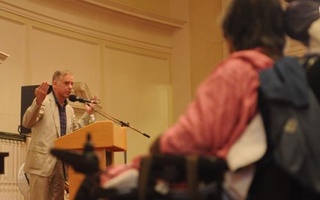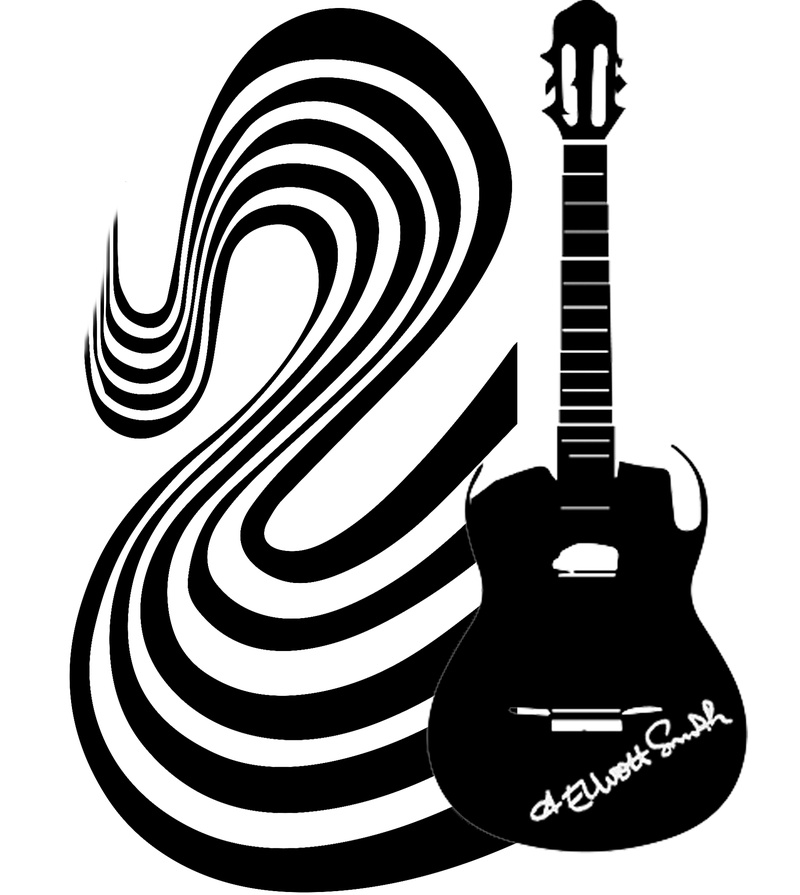He’s off on another brisk morning jog by the Charles. When he pauses to lie down in the grass, twigs and critters catch in his hair. He has a full set of straight teeth, absenting those ultimate molars. How fine to be young—virile, puerile, here for a while. Everything is exactly right for a second-year Harvard student with a heart full of love, healthy and clear-headed, stretching his legs on a Sunday antemeridian to feed Pringles to the geese. So why the funk? Do you still want to be a pre-med? He don’t like these questions—so he runs. Ah: runs. Riverrun past Leverett and Mather and Updike’s environs.
“It’s not good to listen to too much of Elliott Smith at once,” says the older brother over cell phone. “It can start to bring you down.” So maybe I’m just listening to too much sad music! Smith’s work is not the obvious accompaniment for those sporadic runs, but during sophomore year there was no artist to remotely rival his priority in my iTunes or on visits to Planet Records. His albums were suite background chatter and a full twenty percent of the memory on my first iPod, a device now lost to a fractured screen and the vast carelessness of a weekend in Cambridge.
Like most things, music touches us with impressions and instants. My impression after listening through Elliott’s oeuvre is despondency and nostalgia, nostalgia because this music recalls developmental days in Dover before the millennium when elder siblings played his album “XO” through the house. Then the instants: the moments of clarity in each song when the “little whisper smoke signs” of his voice bring a spooky lyric or casual expletive to contrast with a shiny, shimmering guitar chord. Or an epiphanic moment of your personal history, when in the first week or two of college you attend a screening of “Good Will Hunting” at the Science Center and recognize him in the soundtrack. At that moment what you really want is to tell Matt Damon to stop making lewd jokes so you can properly enjoy the song, “Between the Bars.”
Elliott went to school not far from here, at Hampshire College in Amherst, MA. After graduating in 1991 he did more than any of us could hope for with a liberal arts degree: moved back to Portland to build a name for the band he started with his classmate. “Heatmiser” found a label and released a few albums, earning its place in an historic decade for the City of Roses. Our protagonist soon found success with solo work on “Roman Candle” and a self-titled debut, followed as these things go by the dissonant dissolution of the old band. He famously met Gus Van Sant in Oregon and contributed a few songs to the dude’s movie; of these “Miss Misery” got nominated for an Oscar but lost to “My Heart Will Go On” in 1998.
Smith once commented that his songs are like “little movies”; furthermore, that when he writes music he likes to conceptualize it as shapes. The result is a harmony of stacked chords that create an “implied melody” and scenes built out of disjointed images with their own dark symbolism, for example “two tickets torn in half” or “spun glass in sore eyes.” There is an essential theme of fragmentation throughout his work that reflects an ongoing struggle with identity, with the sense of wholeness in relation to himself and his surroundings. So often his song is a nocturne with the speaker lost beneath the moon’s bare light bulb, strung out on a mesh of raw veins, the “maraña de vena reciente” from García Lorca’s poem “Ciudad Sin Sueño.” He ponders the cracks in the sidewalks, tries to assemble puzzle pieces, and struggles to pronounce some name that you keep repeating.
Maybe he just can’t express himself properly; too much “static in [his] head” amounting to a “beautiful confusion” that can only hint at some kind of trauma in his past. One might think of the “unspeakable things unspoken” that Toni Morrison created in her novel “Beloved.” One might also consider “Either/Or,” the 1843 Kierkegaard book after which Smith named his third album. Here the Danish philosopher describes a type of being that is “jealous for itself aesthetically” and only finds completion with “the interposition of another”; finally, the artist puts his undergrad degree to some use. It’s all too tragic that Smith’s legacy should have so much to do with his long battle with alienation and addiction. We could do more to appreciate his prodigious talent as a musician and songwriter, more sensitive even to heartache than heroin. Yet as long as he can point to the peculiar relationship between “broken plans” and “broken plants,” his music will have a meaningful following and an additional aesthetic complement. Just look at the comments on his YouTube videos.
Sometimes things get broken up by the regular events of living. The unfathomable booty-twerking that shattered a window in the SOCH at the class of 2014’s First Chance Dance; the set from General Trotsky and the Confederates that rocked its blues-punk hard enough to fracture a pane in Holden Chapel during WHRB’s Battle of the Bands; the glassy stillness of the river broken by idiot kids on the traditional leap from Week’s Footbridge. Other things only seem broken, and you may battle in vain to find meaning or coherence when life ceases to be as straightforward as you expected. There’s no way to understand what happened when Smith evidently took his own life in late October 2003. But as the many people who find strength and resilience from his music will attest, there’s nothing trivial about your suffering—no matter its form—and you’re never alone.
—Columnist David Grieder can be reached at davidgrieder@college.harvard.edu.
Read more in Arts
"Writing Terror" at the Boston Book FestivalRecommended Articles
-
 Howard Dean Hails Public Option
Howard Dean Hails Public Option -
 Bartley's Window Smashed
Bartley's Window Smashed -
 Bartley Identifies 'Suspects' Who Broke Store Window
Bartley Identifies 'Suspects' Who Broke Store Window -
Cambridge City Council Candidate: Larry WardLarry Ward would like to involve the Harvard community in many of the ideas he hopes implement should he return to the Cambridge City Council after the November election.
-
 Harvard Introduces First Gen Ed Curriculum, Travels to Nixon's Kitchen Debate, and Hosts Olympic Soccer
Harvard Introduces First Gen Ed Curriculum, Travels to Nixon's Kitchen Debate, and Hosts Olympic Soccer -
Harvard Law Grad Suspected of $100 Million SchemeJohn D. Cody, a Harvard Law School graduate, was arrested last Monday on charges of fraud up to $100 million over an eight-year period. He used a fake charity to collect donations from 41 states, under the pretense of helping Navy veterans, according to the Huffington Post.














